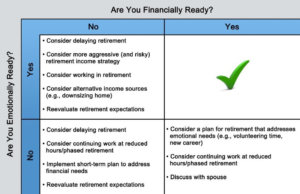
The question is actually more complicated than it first appears, because it demands consideration on two levels. First, there’s the emotional component: Are you ready to enter a new phase of life? Do you have a plan for what you would like to accomplish or do in retirement? Have you thought through both the good and bad aspects of transitioning into retirement? Second, there’s the financial component: Can you afford to retire? Will your finances support the retirement lifestyle that you want? Do you have a retirement income plan in place?
What does retirement mean to you?
When you close your eyes and think about your retirement, what do you see? Over your career, you may have had a vague concept of retirement as a period of reward for a lifetime of hard work, full of possibility and potential. Now that retirement is approaching, though, you need to be much more specific about what it is that you want and expect in retirement.
Do you see yourself pursuing hobbies? Traveling? Have you considered volunteering your time, taking the opportunity to go back to school, or starting a new career or business? It’s important that you’ve given it some consideration, and have a plan. If you haven’t — for example, if you’ve thought no further than the fact that retirement simply means that you won’t have to go to work anymore — you’re not ready to retire.
Don’t underestimate the emotional aspect of retirement
Many people define themselves by their profession. Affirmation and a sense of worth may have come, in large part, from the success that you’ve had in your career. Giving up that career can be disconcerting on a number of levels. Consider as well the fact that your job provides a certain structure to your life. You may also have work relationships that are important to you. Without something concrete to fill the void, you may find yourself scrambling to address unmet emotional needs.
While many see retirement as a new beginning, there are some for whom retirement is seen as the transition into some “final” life stage, marking the “beginning of the end.” Others, even those who have the full financial capacity to live the retirement lifestyle they desire, can’t bear the thought of not receiving a regular paycheck. For these individuals, it’s not necessarily the income that the paychecks represent, but the emotional reassurance of continuing to accumulate funds.
Finally, it’s often not simply a question of whether you are ready to retire. If you’re married, consider whether your spouse is ready for you to retire. Does he or she share your ideas of how you want to spend your retirement? Many married couples find the first few years of one or both spouse’s retirement a period of rough transition. If you haven’t discussed your plans with your spouse, you should do so; think through what the repercussions will be, positive and negative, on your roles and your relationship.
Can you afford the retirement you want?
Separate from the issue of whether you’re emotionally ready to retire is the question of whether you’re financially ready. Simply — can you afford to do everything you want in retirement? Of course, the answer to this question is anything but simple. It depends on your goals in retirement (i.e., how much the lifestyle you want will cost), the amount of income you can count on, and your personal savings. It also depends on how long a retirement you want to plan for and what your assumptions are regarding future inflation and earnings.
Copyright 2006- Broadridge Investor Communication Solutions, Inc. All rights reserved.
Broadridge Investor Communication Solutions, Inc. does not provide investment, tax, or legal advice. The information presented here is not specific to any individual’s personal circumstances.
To the extent that this material concerns tax matters, it is not intended or written to be used, and cannot be used, by a taxpayer for the purpose of avoiding penalties that may be imposed by law. Each taxpayer should seek independent advice from a tax professional based on his or her individual circumstances.
These materials are provided for general information and educational purposes based upon publicly available information from sources believed to be reliable—we cannot assure the accuracy or completeness of these materials. The information in these materials may change at any time and without notice.
*Non-deposit investment products and services are offered through CUSO Financial Services, L.P. (“CFS”), a registered broker-dealer (Member FINRA / SIPC) and SEC Registered Investment Advisor. Products offered through CFS: are not NCUA/NCUSIF or otherwise federally insured, are not guarantees or obligations of the credit union, and may involve investment risk including possible loss of principal. Investment Representatives are registered through CFS. Coastal Federal Credit Union has contracted with CFS to make non-deposit investment products and services available to credit union members.
CFS representatives do not provide tax or legal guidance. For such guidance please consult with a qualified professional. Information shown is for general illustration purposes and does not predict or depict the performance of any investment or strategy. Past performance does not guarantee future results.
Trust Services are available through MEMBERS Trust Company. CFS* is not affiliated with Members Trust Company.






